“The Beginning” screened at a special Thaal Pe Charcha event in Mumbai
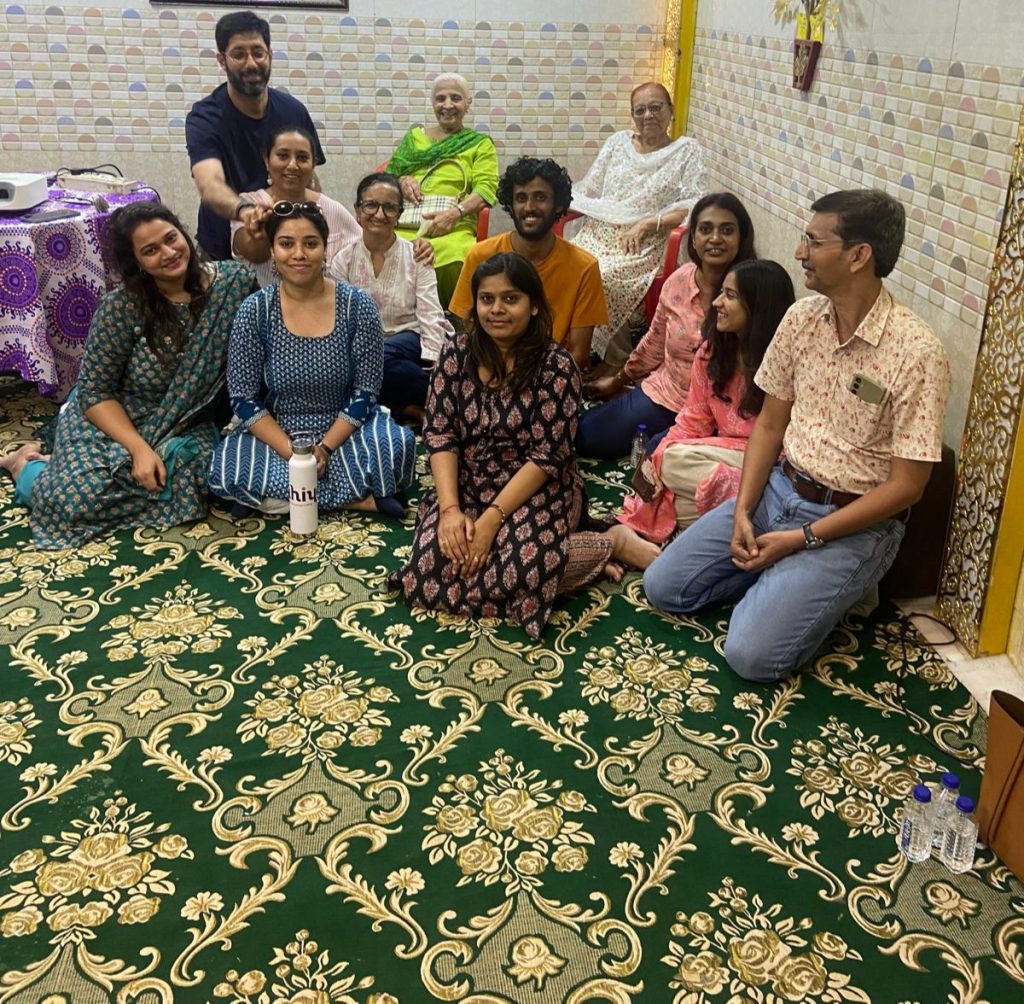
By Aarefa Johari On October 26, 2024, Sahiyo hosted a Thaal Pe Charcha, or TPC, event in Mumbai. TPC is Sahiyo’s flagship program initiated by the Sahiyo team in India, bringing small groups of community members together in safe spaces to have conversations about female genital cutting (FGC) while bonding over a traditional Bohra “thaal” meal. Since 2017, Sahiyo has organized 13 TPC events in Mumbai and Pune in India and two in the United States, reaching nearly 100 participants. Our October event was special for many reasons. First, it was an in-person TPC event that we were able to host after nearly a two-year break. We had 12 participants from across Mumbai from different backgrounds and professions, with some in their early 20s and others as old as 80. A few were attending TPC for the first time and shared poignant stories about their experiences with FGC. Second, this TPC was organized in partnership with our friends at Equality Now, who not only supported the event itself but also produced “The Beginning.” A short fiction film on FGC written and directed by Sahiyo co-founder Insia Dariwala, “The Beginning” is about the trauma and dilemma of a Bohra mother whose daughter is set to undergo FGC. During October’s TPC, we watched the film together, and it evoked a range of emotions from participants. A survivor of FGC said she could strongly identify with the story of the protagonist, while a male participant found himself relating to the pressures placed on the protagonist’s husband. Others discussed the many ways in which the film highlighted the nuances of community dynamics that make it difficult to take a stand against FGC. At the end of the TPC event, young participants in particular said that the film encouraged them to have conversations about ending FGC with more community members. This feedback, for us, was the most fulfilling takeaway from the event.
Thaal Pe Charcha: February 2020

On February 8th, as part of our International Zero Tolerance Day for FGM/C, Sahiyo hosted its first Thaal Pe Charcha (TPC) for 2020, with a special private screening of ‘A Girl from Mogadishu’, directed by Mary McGuckain. The film is a true story based on the testimony of Ifrah Ahmed, a Somalian whose suffering acted as catalyst for one of the world’s biggest and most successful movements to end gender-based violence and female genital cutting. The Sahiyo team and Thaal Pe Charcha participants were deeply moved by the film, and found resonance in Ifrah’s journey on fighting a practice deeply rooted in the culture and tradition of a community constantly seeking ways to establish their identity. ‘Thaal Pe Charcha’, in which a diverse group of participants gather around a meal, and encourage conversations about ending Khatna (FGC) within the community, is currently in its third year and is one of Sahiyo’s more successful ground activities, which provides a safe environment for sharing solutions and stories. Read about this ‘TPC’ through the lens of one participant in this thoughtful blog piece.
Thaal Pe Charcha
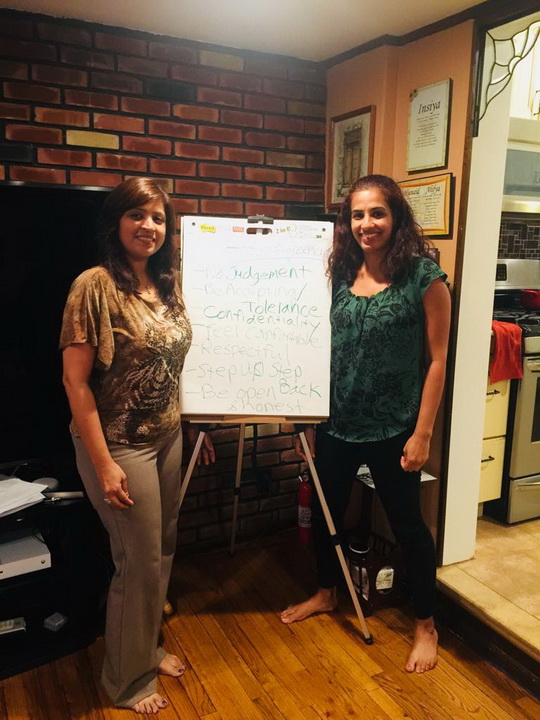
Thaal Pe Charcha (TPC), which loosely translates as “having discussions while eating food”, is a flagship Sahiyo programme where Bohra women are brought together in a private, informal setting so that they can bond over food and discuss issues that affect their lives, like FGC or Khatna.
Virtual Thaal Pe Charcha goes pan India
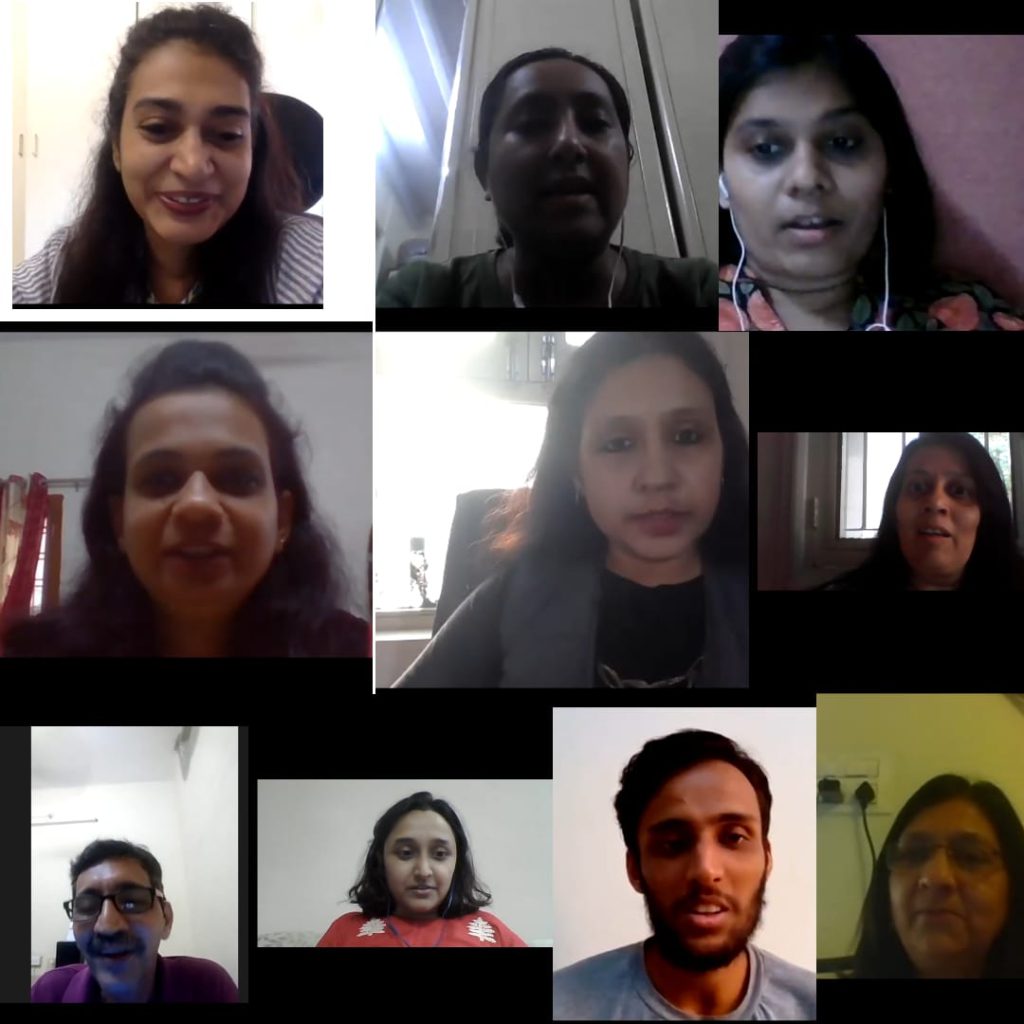
Sahiyo held an online Thaal Pe Charcha (TPC), which loosely translates as “discussions over food,” on October 31st. TPC is a flagship Sahiyo program typically held in person, but was conducted online due to safety during the pandemic. The current COVID-19 situation may have restricted this TPC to a virtual interaction and taken away the joy of relishing traditional Bohra cuisine. However, participants were satiated with the conversations that unfolded over the 2-hour program, and as noted by one participant, provided enough food for thought to go around at this event. The program lead and Sahiyo co-founder, Insia Dariwala, successfully incorporated creative activities so that participants could connect and bond with each other. Over the last three years, TPC has seen a lot of growth, and this was the first ever TPC where participants joined in from various cities in India, including Mumbai, Ahmedabad, Hyderabad and Pune. The success of any program lies in its ability to create sustainability and leadership. This was remarkably displayed by one of Sahiyo’s volunteers, Jumana, who under the guidance of Dariwala and Chandni Shiyal, independently organised and hosted TPC from her residence in Ahmedabad. The camaraderie between the participants was commendable, and it was heartening to see total strangers holding space for each other, and bonding over the shared pain of female genital cutting (FGC). Some of these women had never shared their stories with anyone, and needless to say, it was a catharsis for many. Other discussions also included male versus female circumcision, its relevance, consent of the child, and also medicalization of FGC. The event ended with many expressing a desire to host TPC in their own hometowns, and creating more opportunities to continue discussions on this topic.
Sahiyo hosts first virtual Thaal Pe Charcha
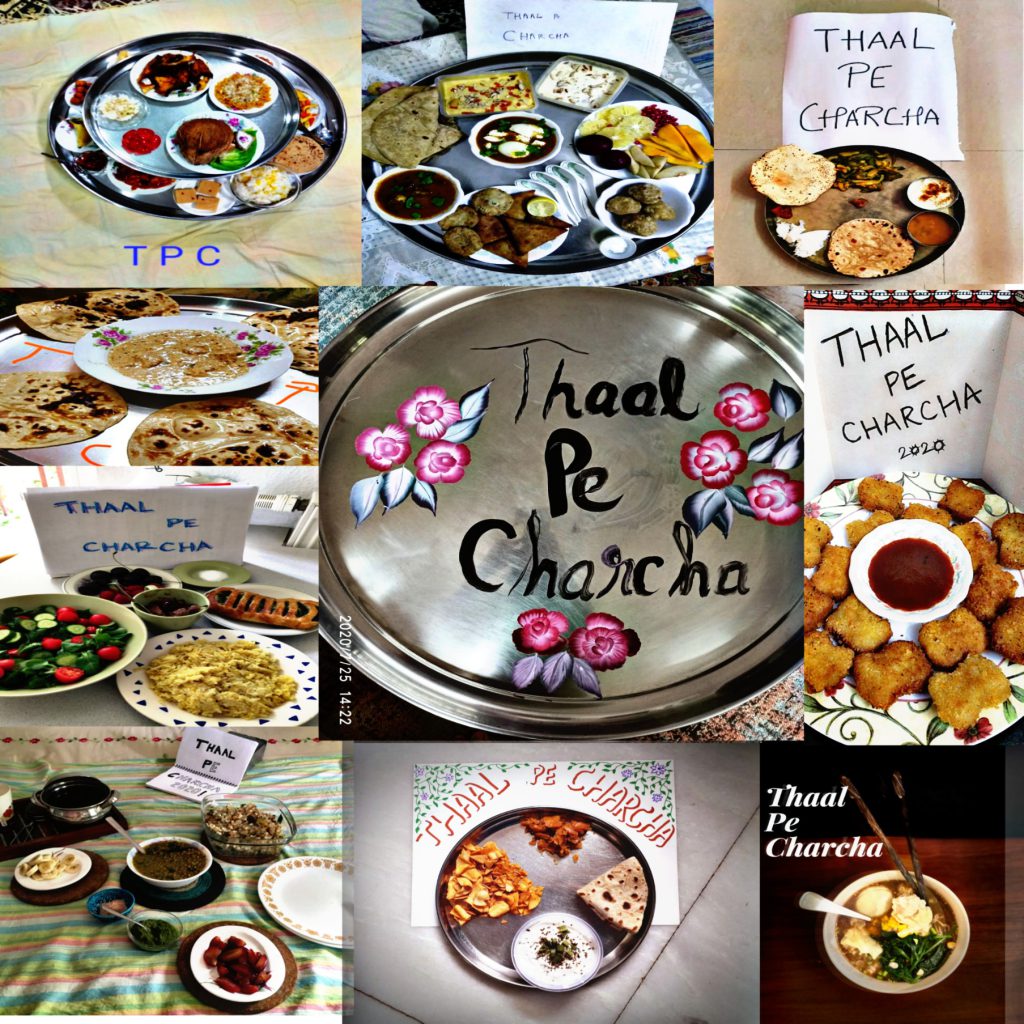
In July 2020, Sahiyo hosted a Thaal Pe Charcha (TPC, loosely translated as discussions over food) with thirteen participants from the Bohra community. Thaal Pe Charcha (TPC) is a flagship Sahiyo programme that brings Bohra women together in an informal, private space, so that they can bond over traditional Bohra cuisine while discussing female genital cutting (FGC) and other issues that affect their lives. Due to COVID-19, we had to cancel all our on the ground events and organize an online TPC this month. To make the virtual event successful, we incorporated creative activities so that participants could connect and bond with each other despite the physical distance. Since the virtual event could not incorporate an actual shared meal, we asked participants to share creative pictures of the food they had eaten that day. Many participants enthusiastically shared these photos to recollect the memories of the in-person TPCs. During the web session, we started with describing why we choose to wear a particular color that day inspired by Carl Jung’s color psychology theory. This encouraged us to dress up even though we were in our homes. Then we proceeded to discuss how COVID-19 is impacting our personal and professional lives. Some of the experiences shared included how it is difficult to manage work and caring for young children; some of us lost loved ones during this time; and others shared they were concerned about their finances. We acknowledged that this is a difficult time for everybody. We also discussed FGC during COVID-19. Ideas about studying what happened with the FGC trend in Africa during the Ebola crisis were shared. Also, interesting thoughts such as how people are following other cultural rituals like the mundan (a ceremony where a child receives their first haircut) during this time might give us insight into the practice of FGC during the pandemic. Worry about the rise of non-medical cutters was shared. It is a known fact that summer vacation sees a rise in the number of cuts and many people from abroad bring their children to India, in what has been classified as vacation cutting. One of the participants confirmed this by sharing how Udaipur (her hometown) sees an influx of diasporic Indians bringing their daughters for the cut every year. However, because of COVID-19, that has not happened this year. It was also pointed out that there is a need to have conversations like these and to participate in more webinars because raising awareness can curb future incidents of FGC. We encouraged participants to try and find out if there have been any cuttings during the pandemic, and some of our participants will be getting back to us with the information they receive from the community. At the end of the event we performed a mirroring activity where we copied each other’s feelings and actions to give us a sense of togetherness.
Why are we doing this? A Thaal pe Charcha participant questions female genital cutting
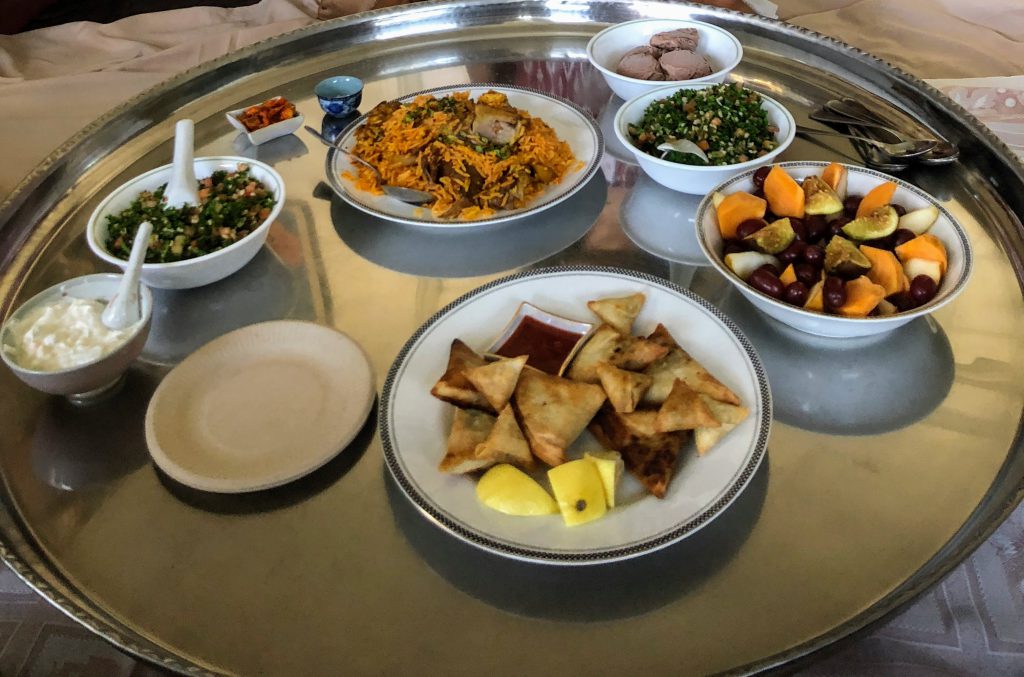
By Anonymous Country of Residence: India Age: 32 I have been part of the Sahiyo Thaal Pe Charcha group meetings for a while and have found it an eye-opening concept. The more I’ve been involved, I’ve become more aware of female genital mutilation/cutting (FGM/C). In the first meeting, I came to know it as a social stigma that we women face due to misguided traditions. Knowing that more people support the cause made me feel a bit more confident to talk about it. Hearing about the issue of FGM/C made me more aware that people blindly do it because their familes do it. Some of them may do it out of fear and for the approval of society. During the recent February meeting we were shown a movie, A Girl from Mogadishu, based on the life of a Somalian FGM/C survivor and activist, Ifrah Ahmed. Her whole life she believed the tradition of FGM/C needed to be followed, as her ancestors did the same, so she never questioned it. But migration opened her eyes to the fact that what happened to her was not right. She did not deserve to suffer pain just because her society carried this practice for centuries blindly. I, myself, find a lot of people like my family and friends who are afraid to ask the questions: Why are we doing this? Is it necessary to hurt a girl in childhood? That psychological wound is so deep and may never be healed. No one can remember their childhood memories perfectly, but when something painful happens for some, it’s impossible to forget. I really want more people to share their experiences, come out of denial and support the cause to pledge to not let the next generation or anyone undergo the same pain they, themselves, might have undergone.
Taking the anti-FGC movement forward, with Thaal Pe Charcha participants
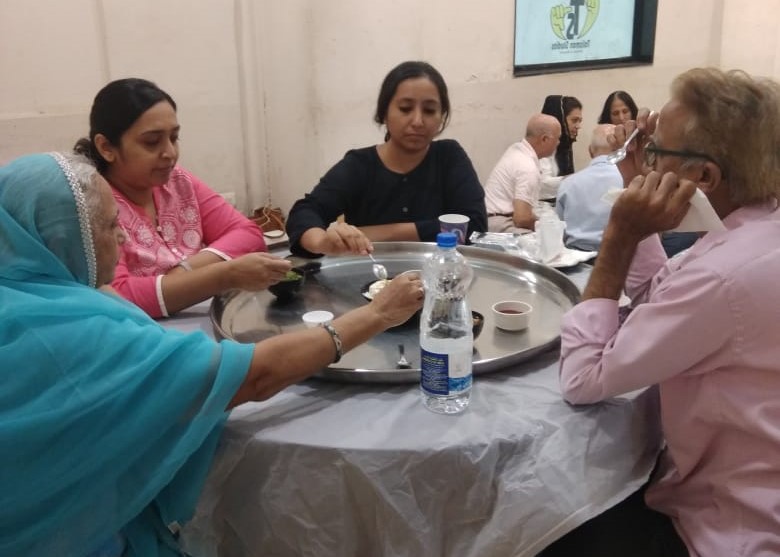
On 17th November 2018, Sahiyo hosted its seventh Thaal Pe Charcha (loosely translated as “discussions over food”) in Mumbai, India, with a diverse group of 17 participants. TPC is a flagship Sahiyo program where Bohra women are brought together in a private, informal setting to bond over food and discuss issues that affect their lives, particularly Female Genital Cutting or Khatna. For the November event, two participants travelled specially from Pune and Kerala respectively. During this TPC, participants were divided into two groups that drew up plans for taking the movement against FGC forward through two different approaches. One group discussed engagement with lawmakers, medical professionals and other social stakeholders, as well as raising social awareness about FGC through animation videos and other such media. The second group discussed taking Thaal Pe Charcha itself forward, by reaching out to more and more members of the community and bringing in new participants along with them for the next TPC. They also discussed plans to reach out to Bohras in rural areas and organising their own TPC events with their friends and relatives. The groups formed separate Whatsapp groups to stay in touch and monitor the progress of their activities.
When Thaal Pe Charcha participants met Mumbai’s Veteran Activists
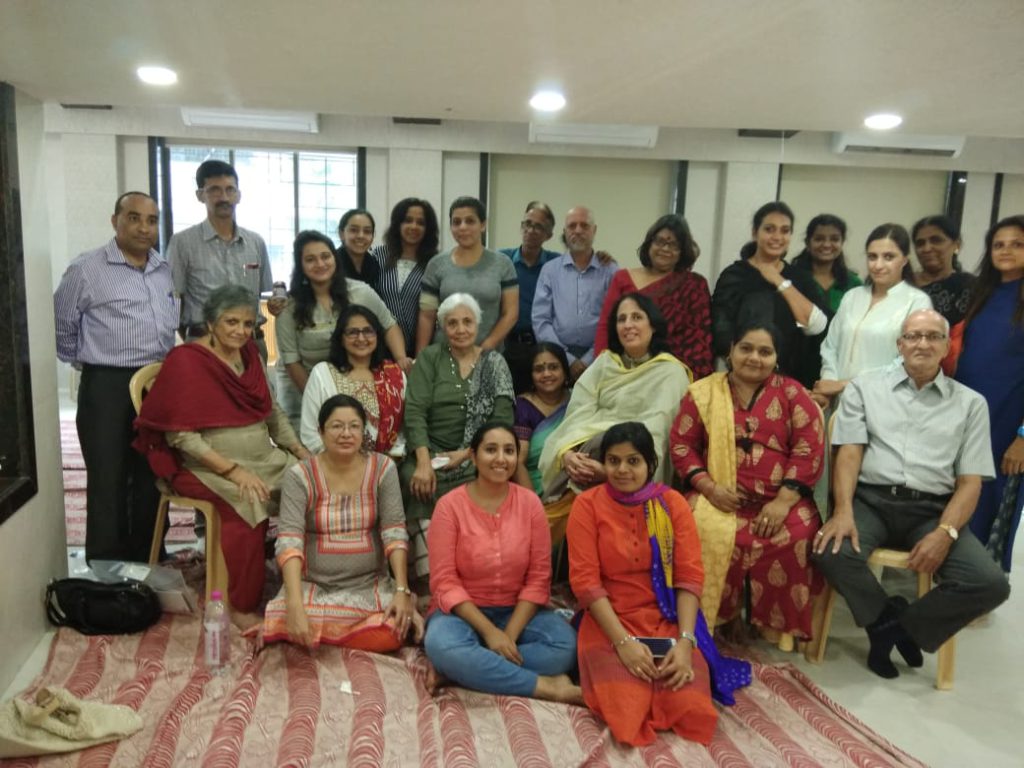
On 4th August 2018, Sahiyo hosted its sixth Thaal Pe Charcha (loosely translated as “discussions over food”) in Mumbai, India. TPC is a flagship Sahiyo program where Bohra women are brought together in a private, informal setting to bond over food and discuss issues that affect their lives, particularly Female Genital Cutting or Khatna. The TPC in August was unique because in addition to several regular and new participants from the Bohra community (five of whom were men), the event also featured women leaders and activists from various non-profit organizations working on women’s rights. They were invited to interact with participants and share their experiences, struggles and the knowledge gained in their journeys as women’s rights advocates. One of the activists was Flavia Agnes, a veteran feminist lawyer from Majlis, who was at the forefront of India’s women’s movement in the 1980s. Agnes shared her story of surviving domestic violence and going on to become a prominent lawyer helping other women with legal support in their fight for justice. Other guest speakers included Noorjehan Safia Niaz, the co-founder of the Bharatiya Muslim Mahila Andolan (BMMA), a prominent Muslim women’s organisation, and her team of two women Qazis (Islamic jurists) from BMMA. The three of them spoke about their struggle to get the practice of unilateral instantaneous divorce or triple talaq to be recognised as unconstitutional in India, as well as their efforts to bring justice to Muslim women by training women to become Qazis — a profession only open to men within traditional Islam. Dr. Sheroo Zamindar, a gynaecologist from Ahmedabad, also explained the medical consequences of undergoing Khatna. Participants of the TPC were enthusiastic in their interactions with the guest speakers and in their feedback to Sahiyo, mentioned that they appreciated the diverse perspectives that they offered during the event.
‘I have convinced my friends to refrain from Female Genital Cutting’

On January 27, 2018, Sahiyo hosted its fourth Thaal Pe Charcha (loosely translated as “discussions over food”) in Mumbai, India, with a diverse group of 18 participants. TPC is a flagship Sahiyo program where Bohra women are brought together in a private, informal setting to bond over food and discuss issues that affect their lives, particularly Female Genital Cutting or Khatna. The participants, six of whom were men, discussed ongoing developments around the movement to end khatna. Men were invited to share their own experiences of male circumcision as well as comment on the Khatna experience of young girls in the community or within their families. The participants were eager to be proactive in raising awareness about the harmful effects of Khatna on girls. One male participant shared that he convinced his mother and wife not to cut their seven-year old daughter by explaining the possible damage it could do to a child’s body and mind. He said, “I have also convinced my friends and their wives to refrain from doing this practice. There is just no need for it.” Towards the end of the event, Sahiyo organized a special healing session for the women participants, conducted by a well-known alternate healing therapist who specializes in reconnective healing therapy. The therapist, Shabnam Contractor, is a member of the Bohra community and was able to understand how FGC might have affected the women participants. In the hour-long session, she helped participants explore aspects of their lives that may have been affected by undergoing FGC. After the session, most women experienced a sense of relief and expressed an interest in more such sessions in subsequent events.
Sahiyo Hosts ‘Thaal Pe Charcha’ Iftar Party in Mumbai

On May 11, Sahiyo India hosted a special Thaal Pe Charcha “Iftar” dinner in Mumbai during the holy month of Ramzan. The event was attended by 24 women and men from the Bohra community, who came together to break their Ramzan fasts and also mark two years since Sahiyo launched its flagship programme of Thaal Pe Charcha. Loosely translated as “discussions over food”, Thaal Pe Charcha provides community members with a safe and intimate platform to share their stories, experiences, and feelings about the practice of Female Genital Cutting, while bonding over traditional Bohra food. At least 50 community members have participated in Thaal Pe Charcha events over the past two years, and the Iftar dinner on May 11 saw five new participants join in, with several questions about the nature of the practice of FGC in the community, the arguments for and against it, and the work done by the movement against the practice. Two of the participants also brought their children for the event, including the seven-year-old daughter of Zohra, an FGC survivor. Girls in the Bohra community are typically cut at age seven, and Zohra expressed pride in the fact that she would not be continuing the practice on her daughter. The first Thaal Pe Charcha in Pune cityEarlier, in April, a Bohra FGC survivor and activist from Pune city hosted a small Thaal Pe Charcha lunch at her own home. The survivor, who identifies herself with the pseudonym Xenobia, had participated in Sahiyo India’s 2019 Activists’ Retreat in January. One of the workshops at the retreat was about hosting one’s own Thaal Pe Charcha in order to expand the conversations about FGC to more people. Xenobia was one of the first participants to volunteer to host her own Thaal Pe Charcha after the workshop, and the lunch she hosted at her house had 7 participants. Read about Xenobia’s experience of hosting the lunch in her own words, by clicking here.
